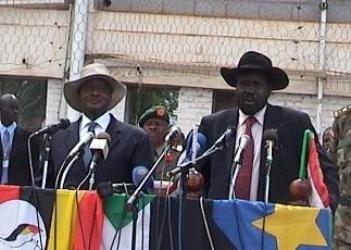South Sudan’s Kiir, Museveni discuss trade relations
By Julius N. Uma
December 22, 2012 (JUBA) South Sudan President, Salva Kiir and his Ugandan counterpart, Yoweri Museveni on Saturday met to discuss ways of enhancing strong bilateral trade relations between the two countries.

President Kiir, in a brief media address shortly after their meeting, said the two neighboring countries extensively discussed and agreed to remove all trade obstacles usually experienced at border locations.
South Sudan has in recent years, emerged as the largest importer of Ugandan goods. Currently, over 150,000 Ugandan traders, according to the trade and industry ministry, operate across the border, generating an estimated $900 million in business.
Land locked South Sudan still relies heavily on its neighbors to provide goods such as construction materials and services such as skilled and unskilled labor, with approximately 1,500 Ugandans work in Southern Sudan in the construction industry.
In recent years, however, Ugandan traders have complained about constant harassments, intimidation and corruption at the border with South Sudan, an allegation officials have often denied.
President Museveni, meanwhile, said the discussions he held with his South Sudanese counterpart were “fruitful” and will help strengthen further relations between Uganda and the young nation.
The Ugandan leader, who travelled by road to the South Sudan capital, said he was impressed with the improvement in road conditions, citing the 192km Juba-Nimule stretch, which was tarmarked with assistance from the US government.
Museveni said both countries also talked about the need to secretly dispatch spies at border points to monitor whether officials take brides, ensuring that appropriate measures are taken them, if they are implicated.
(ST)
